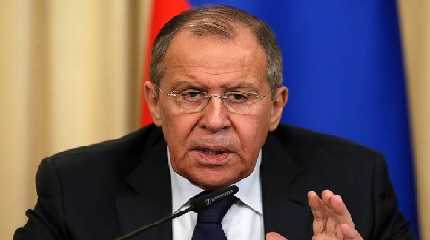
ANTALYA /Turkey/, March 10. /TASS/: Moscow has never wanted war and seeks to end the current conflict, Russian Foreign Minister Sergey Lavrov said at a press conference following a meeting with his Ukrainian and Turkish counterparts, Dmitry Kuleba and Mevlut Cavusoglu.
He pointed out that Moscow was ready to discuss security guarantees for Kiev, did not rule out the possibility of a meeting between Presidents Vladimir Putin of Russia and Vladimir Zelensky of Ukraine and did not expect a conflict involving nuclear weapons to break out.
TASS has put together the key statements that Lavrov made.
Additional platform
The main talks between Moscow and Kiev take place in Belarus, where the two countries’ delegations have already met three times: "A business-like conversation is underway there."
Moscow is currently waiting for "a specific response" to the "extremely specific initiatives in the form of a draft legal document," which were presented in the third round of talks.
Kuleba’s regret about the fact that no progress had been achieved in Antalya on the 24-hour ceasefire issue, is groundless: "No one was going to make a ceasefire agreement here. We did not come here to replace the Belarusian negotiation platform."
At the same time, Russia is ready to hold meetings on various platforms, including at the highest level. The possibility of a meeting between Presidents Vladimir Putin and Vladimir Zelensky was discussed at the Antalya meeting "but it requires preparations."
Ukraine operation
Moscow does not have any aggressive plans against other countries. "We are not planning to attack other countries. In fact, we did not attack Ukraine, either." However, Russia has information that Kiev planned to launch an offensive against Donbass as early as March.
Russia’s proposal to open humanitarian corridors every day for the evacuation of civilians from battle zones remains in place.
Allegations about Russian troops kidnapping people in Ukraine are fake news, while the maternity hospital in the city of Mariupol, which was targeted by the military, had stopped being used for its intended purpose long ago: "It was turned into a base for the far-right Azov battalion."
Nuclear tensions
Lavrov does not expect a nuclear war to break out. "I don’t want to believe in it and I don’t. I would like to point out that the nuclear issue <...> was brought up solely by Western politicians, namely those from NATO countries."
Moscow is alarmed by the fact that the West keeps talking about possible nuclear tensions: "It’s certainly alarming that the West keeps raising this topic in a Freudian manner."
Relations with West
Moscow will solve economic problems triggered by Western sanctions to make sure that it will never depend on the West again: "We will never have illusions again that the West might be a reliable partner. <...> And we will never have illusions that the West won’t betray the other party at any moment. It will betray everyone and even its own values."
The West’s "frenzied" reaction to Russia’s actions in Ukraine "shows that an actual life or death struggle is underway for Russia’s right to exist on the world map and fully ensure its legitimate interests."
Russia put forward its proposals on security guarantees "in full seriousness" but got only "reference notes" in response. "When we deal with honest people, we handle matters honestly and had it been like that, everything would have been resolved and security agreements would have been reached. However, we don’t see partners who would be willing to deal with us honestly."
Western countries are creating threats primarily to themselves by providing weapons to Kiev because these weapons, including man-portable air-defense missile systems, may get out of control: "It will create risks and threats to civil aviation over Ukraine that will linger for years, and they may also spread to all of Europe."
US biolabs
Russia demands that the United States provide explanations about the activities of its biological laboratories in Ukraine, an official request on the matter has already been sent: "There is almost no doubt that the experiments that were conducted there weren’t peaceful but were aimed at creating biological weapons, moreover, weapons targeted at certain ethnicities."
However, Moscow was not surprised by the West’s reaction to reports about the labs. "It’s not surprising that Washington officials have publicly rejected ‘rumors,’ which is what they called it, about their outlawed activities in Ukraine. It’s also not surprising that European Union countries immediately started saying with one voice that they did not have any information about the Americans being involved in some military biological activities in Ukraine".




